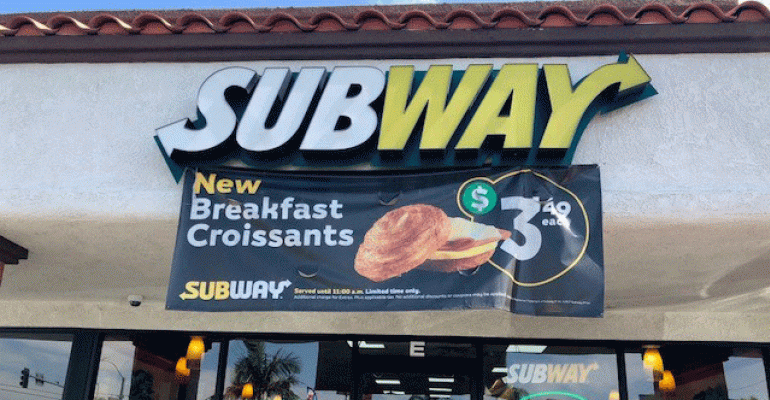Though Subway is now allowing franchisees to opt out on breakfast, the sandwich chain said most U.S. operators are not throwing in the towel on the 8-year-old morning grub program.
The breakfast waiver came into effect in April “to better address the needs of the market,” Subway Vice President of North America James Walker told Nation’s Restaurant News in a statement.
Subway added the opt-out of breakfast option to an existing waiver that allows franchisees to modify their hours of operation.
“We expect that the majority of U.S. restaurants will continue serving breakfast,” Walker said.

That is true for Bob Grewal, a development agent who oversees 2,100 Subway stores in Southern California, Washington D.C., Virginia, and Ontario, Canada.
Of those, he said only 10 units have shown interest in scrapping breakfast. The rest are all-in because the breakfast segment performs well for those restaurants.
“My markets are still continuing with breakfast,” he said. “In fact, we’re doubling down on it. “
Many of his units are concentrated in Southern California, which added croissant breakfast sandwiches earlier this year.
It’s been a successful regional menu launch, said Grewal, who operates 40 of his own Subways in the greater Los Angeles area.
Grewal said breakfast is lucrative for most of his locations, because some walk-in diners often buy their lunch to-go, as well.
“In my personal stores, I would say half the people that come in actually buy footlong sandwiches in the morning and take them to work,” he said.

Walker, who started last July at Subway, said the breakfast waiver is part of the company’s overall strategy to work with franchisees to make “adjustments as needed” to be successful.
“We are continuously evaluating every consumer touchpoint (including hours of operation, menu, day part, etc.) and making adjustments as needed to help Subway Franchisees be more successful,” Walker said in a statement. “Each Subway location and customer base is unique, and our goal is to provide Franchisees with the resources to deliver an exceptional guest experience while running a profitable business. Their success is our success.”
Buzz about the breakfast waiver was first reported by Bloomberg. In a separate article, the business publication said Subway is facing backlash from operators over its new loyalty program.
“Franchisees, who own and operate all Subway restaurants, say the company didn’t provide them with enough financial data to support the rewards program that the chain introduced this spring in the U.S. and Canada. They say they’re being charged a 1.9 percent royalty fee related to the program that hasn’t been financially justified,” Bloomberg reported in late May.

Subway spokeswoman Katie Coleman said Subway MyWay, which started in March, has had daily enrollments that are 10 times that of the previous program.
“We conducted extensive research to develop the new Subway MyWay Rewards Program, including surveying existing Subway Rewards loyalty members, franchisees, our customers and customers of our competitors. The majority expressed excitement for our new program,” she said in a statement.
She said the 1.9 percent fee mentioned by Bloomberg is “not a royalty fee.”
“Franchisees only pay this fee for loyalty transactions,” she said. “The company has invested hundreds of millions of dollars in this new loyalty program, and the settlement fund reimburses franchisees for the cost of items customers redeem in their shops. Each franchisee pays into the central fund to instill fairness when the rewards are reimbursed.”
The buzz over breakfast and the new loyalty program occur amid major changes for the brand. In May, Suzanne Greco said she will be retiring as Subway CEO after three years. Brand development chief Trevor Haynes will act as interim CEO.
The Milford, Conn.-based sandwich chain is also downsizing its North American footprint. The company’s aggressive revitalization plan calls for closing, consolidating or relocating a few hundred locations in 2018 as it looks to expand globally.
International growth will occur in markets with “pent up” demand for the brand, including China, Saudi Arabi, India, Korea, Germany, other European markets, Subway executive Walker told Nation’s Restaurant News last month.
Subway currently has about 25,908 restaurants in the U.S., down 836 units compared to 2017, the company told NRN Top 200 researchers.
Contact Nancy Luna at [email protected]
Follow her on Twitter: @FastFoodMaven





